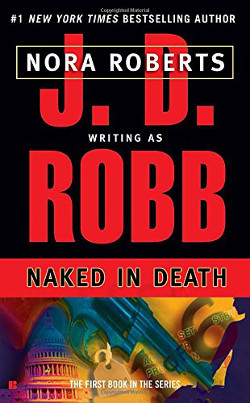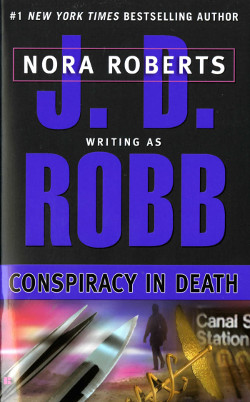
I initially conceived of this article as a way to convince readers who dismiss Nora Roberts with a wave and an eye roll of her considerable writing skills. But I put that article away because my words, no matter how eloquent they might be, wouldn’t cut it. The best supporting evidence for Nora Roberts is Nora Roberts’s own words.
Instead, I pulled short excerpts from Roberts’s stories and juxtaposed them with bestselling or acclaimed works by authors who don’t receive the same unearned, unwarranted, and unnecessary look of disdain.
First, let’s look at four mystery openings:
Samuel Spade’s jaw was long and bony, his chin a jutting v under the more flexible v of his mouth. His nostrils curved back to make another, smaller, v. His yellow-grey eyes were horizontal. The v motif was picked up again by thickish brows rising outward from twin creases above a hooked nose, and his pale brown hair grew down–from high flat temples–in a point on his forehead. He looked rather pleasantly like a blond satan.
***
She woke in the dark. Through the slats on the window shades, the first murky hint of dawn slipped, slanting shadowy bars over the bed. It was like waking in a cell.
For a moment, she simply lay there, shuddering, imprisoned, while the dream faded. After ten years on the force, Eve still had dreams.
Six hours before, she’d killed a man, watched death creep into his eyes. It wasn’t the first time she’d exercised maximum force, or dreamed. She’d learned to accept the action and the consequences.
But it was the child who haunted her.
***
It happened every year, was almost a ritual. And this was his eighty-second birthday. When, as usual, the flower was delivered, he took off the wrapping paper and then picked up the phone to call Detective Superintendent Morell who, when he retired, had moved to Lake Siljan in Dalarna. They were not only the same age, they had been born on the same day—which was something of an irony under the circumstances. The old policeman was sitting with his coffee, expecting the call.
***
In the corner of a first class smoking carriage, Mr. Justice Wargrave, lately retired from the bench, puffed at a cigar and ran an interested eye through the political news in the Times.
He laid the paper down and glanced out the window. They were running now through Somerset. He glanced at his watch. Another two hours to go.
He went over in his mind all that appeared in the papers about Soldier island.
The quality of the descriptions in all the pieces was the first similarity I noticed between the passages. “Blond satan,” and “slanting shadowy bars,” both evoke menace, as opening lines should in a suspense novel.
Every beginning but the first also evokes a sense of place: a bedroom, a desk at a police station, a train carriage. All four immediately introduce us to singular characters. The skill of the authors to pull the readers immediately into the storyverse is evident.
 The first excerpt is, of course, the Maltese Falcon by Dashiell Hammett. The second is the opening of Naked in Death by Nora Roberts/J.D. Robb. The third is the beginning of The Girl with the Dragon Tattoo by Stieg Larson—which supposedly introduced a new kind of heroine to mystery, though Lisbeth was created long after Eve Dallas. The fourth is the beginning of And Then There Were None by Agatha Christie.
The first excerpt is, of course, the Maltese Falcon by Dashiell Hammett. The second is the opening of Naked in Death by Nora Roberts/J.D. Robb. The third is the beginning of The Girl with the Dragon Tattoo by Stieg Larson—which supposedly introduced a new kind of heroine to mystery, though Lisbeth was created long after Eve Dallas. The fourth is the beginning of And Then There Were None by Agatha Christie.
But books have to do more than begin well. They have to establish a world where the reader can walk around. Here are three more passages involving setting:
She would never forget it, not for all of her life, standing with her family while Sirico’s burned. The roar of the fire as it stabbed through broken windows, shot up in quick gold towers, was a constant thrum in her ears. There were sirens screaming, whooshing gusts of water pumping out of the big hoses, weeping and shouting. But the sound of the fire, the voice of it all, overpowered everything else.
***
“Daddy, I’m tired,” the little girl in the red pants and the green blouse said fretfully. “Can’t we stop?”
“Not yet, honey.”
He was a big, broad-shouldered man in a worn and scuffed corduroy jacket and plain brown twill socks. He and the little girl were holding hands and walking up 3rd Avenue in New York City, walking fast, almost running. He looked back over his shoulders and the green car was still there, crawling along slowly in the curbside lane.
***
“An experience, Gull reminded himself. You could never have too many of them.
He stepped into the oversimplified screech and twang of truly, deeply bad country music performed by a quartet of grungy-looking guys behind the dubious protection of a chicken-wire fence. At the moment, the only things being hurled at them were shouted insults, but the night was young.
Look at the word choices that do so much with so little. “Roar,” “stabbed,” “thrum,” in the first passage. “Scuffed,” “twill,” the repetition of “walking” to emphasize the gait, and “crawling,” in the second. In the third, we have more strong words: screech, dubious, hurled, shouted. In tandem, they evoke the energy of the bar.
The middle passage is Firestarter by Stephen King. The first is Blue Smoke; the third is Chasing Fire. They’re both by Nora Roberts.
How about dialogue? Here are two excerpts featuring our leads and people who aren’t exactly allies:
“Who sent you to me, Mr. Shephard?”
“Harv,” he said. “Call me Harv. Everyone does.”
I nodded.
“I know a reporter on the New Bedford Standard Times. He got your name for me.”
“You from New Bedford, Harv?”
“No, Hyannis-”
“You’re gonna run for President and you want me as advance man.”
“No.” He did a weak uncertain smile. “Oh, I get it. Hyannis. Hah.”
“Okay,” I said. “You’re not going to run for President. You don’t want me as an advance man. What is your plan?”
“I want you to find my wife.”
“Okay.”
“She’s run away, I think.”
“They do that sometimes.”
***
“Why do they let you in here?”
“Because I bring donuts. Cops have been weak for them for generations.”
“Where’s mine?”
“Sorry, the squad descended on them like rats. I think Baxter licked up the crumbs.”
“He would.” She settled at her desk. “Where’s your camera?”
“She’s outside.”
“Well, get her in here. I haven’t got all damn day.”
“But I thought—”
“Look, do you want a one-on-one or not?”
Each passage relies almost solely on dialogue to convey who the two characters are in the scene, their relationship to each other, and their respective power roles to each other, as well as tossing in a sense of fun about word play.
The first is from Widening Gyre by Robert B. Parker, one of Spenser’s classic first scenes with clients. The second is Lieutenant Eve Dallas entering her office and encountering her frenemy, reporter Nadine Furst, in Witness in Death by J.D. Robb/Nora Roberts.
And, finally, where would a suspense novel be without action?
She rammed her fist into his face and relished the sting of knuckles meeting flesh. Something ripped as she tackled him and sent them crashing to the floor.
He wasn’t soft, and he was desperate. She tasted her own blood, felt her bones jar, saw one quick burst of stars when her head cracked against the wheels of the gurney.
****
I threw a pillow, but it was too slow. She shot him five time in the stomach. The bullets made no more sound than fingers going into a glove.
Then she turned the gun and shot at me, but it was empty. She dived for Malloy’s gun on the floor. I didn’t miss with the second pillow. I was around the bed and knocked her away before she got the pillow off her face. I picked the Colt up and went away around the bed with it.
 The first scene is from Conspiracy in Death by J.D. Robb; the second scene is from the classic Farewell My Lovely by Raymond Chandler.
The first scene is from Conspiracy in Death by J.D. Robb; the second scene is from the classic Farewell My Lovely by Raymond Chandler.
In both scenes, the action is crisp and clear. In the first, Eve Dallas hits her antagonist, feels the sting of the impact, and falls to the floor with him, smashing into something. We’re in her head, feeling what Eve felt.
In the second, Marlowe attempts to save his own life with pillows, and Chandler uses that lovely metaphor of fingers into a glove for the sound of bullets. At no point, even with three people in the scene, do we lose track of any of them, and Chandler adds in the extra dark humor of the pillows as defense against a gun—a terrific touch.
By putting these excepts from Nora Roberts/J.D. Robb next to classic or acclaimed books, I’m not attempting to say she’s better that Hammett, Chandler, Parker, or Christie. No, the point is that Nora Roberts/J.D. Robb has serious writing abilities of her own and belongs in the conversation with these greats.
Roberts can introduce indelible characters, instantly place the reader in a specific setting, write dialogue that sings, and create action scenes that are emotionally intense yet never confuses the reader as to what is happening and to whom.
Nora Roberts’s books are already adored by millions who have no prejudice against the romance genre, and for good reason. But if you’re a reader who makes that face when her books are mentioned? You’re the one missing out.
Check out our review coverage for the entire In Death series by Nora Roberts/J.D. Robb!
To learn more or order a copy of the upcoming Eve Dallas mystery, Echoes in Death, visit:
opens in a new window![]() opens in a new window
opens in a new window![]()
Corrina Lawson is a writer, mom, geek and superhero, though not always all four on the same day. She is a senior editor of the GeekMom blog at Wired and the author of a superhero romance series and an alternate history series featuring Romans and Vikings in ancient North America. She has been a comic book geek all her life and often dreamed of growing up to be Lois Lane.

Literary snobbery is so silly. Robb/Roberts hasn’t been pleasing legions of fans, old and new, for this many years with second-rate writing. Thanks for this illuminating piece.
I always enjoyed Nora’s work but it wasn’t until I compared it to others the world considers great that I realized exactly how much she was being underestimated.
I am new to Nora Roberts…”Come Sundown” which I devoured. In the meantime I have purchased a couple dozen of her now over 100 books. She is a terrific writer.